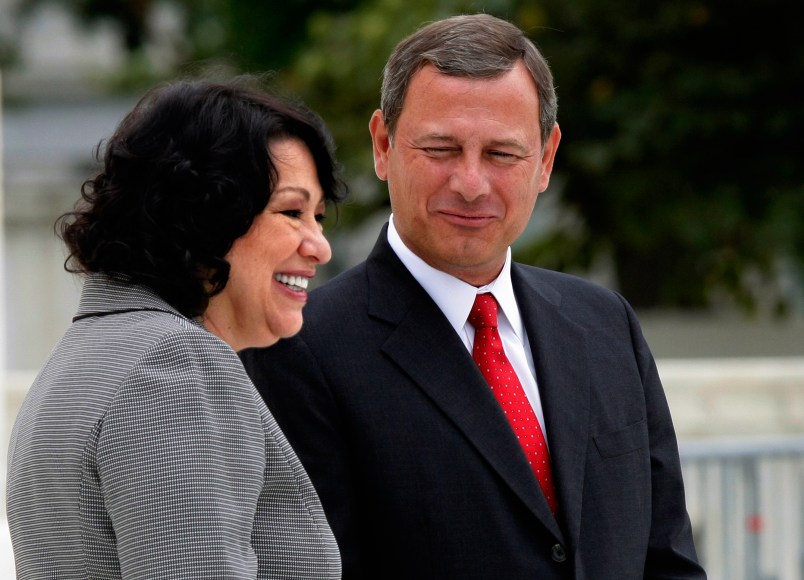It’s gotten heated before — but never this personal or this public.
From slavery to the civil rights era, there have been no shortage of rancorous debates about race in the Supreme Court. But the animosity escalated to a new level this week when justices openly swiped one another over a ruling upholding Michigan’s ban on race-conscious college admissions policies.
In unusually personal terms, Justice Sonia Sotomayor targeted the underpinnings of modern conservative legal philosophy on race in a blistering 58-page dissent, which she took the rare step of reading from the bench. She attacked Justice Anthony Kennedy’s controlling opinion for seeking to “sit back and wish away” racial inequalities, and she dismissed Chief Justice John Roberts’ arguments against race-conscious policies as “out of touch with reality.”
In response, Roberts filed a concurring opinion defending himself against Sotomayor’s charges. “People can disagree in good faith on this issue, but it similarly does more harm than good to question the openness and candor of those on either side of the debate,” Roberts wrote.
Justice Antonin Scalia also jumped in the mix, writing that Sotomayor’s allusion to the Jim Crow era in the context of affirmative action was “doubly shameful.”
Supreme Court experts say this level of personal animosity over race is unprecedented.
“I don’t recall anything like this involving Thurgood Marshall and another Justice,” said Guy-Uriel Charles, the founding director of Duke University School Of Law’s Center on Law, Race and Politics. “Marshall certainly took on his fellow conservative justices on race, but nothing that I recall elicited the type of exchange that we saw between Roberts and Sotomayor.”
Marshall, the first back justice who served from 1967 to 1991, was a celebrated civil rights lawyer who persuaded the Supreme Court to ban state-sponsored segregation. During his time on the court, Marshall wrote strongly worded dissents in racially charged cases involving the death penalty and limited affirmative action measures.
“Marshall wrote some impassioned dissents in the early affirmative action cases (e.g. Croson) but they weren’t personal like this one,” said Adam Winkler, a law professor at UCLA. “Never before have two justices sparred so personally over race. Justices have sharply disagreed about affirmative action, but we’ve never seen such personal disagreement.”

Justice Thurgood Marshall on April 20, 1972 (AP Photo)
Mark Tushnet, a Harvard law professor who once clerked for Marshall, said he doesn’t remember any internal conflict that was so direct. He did recall one revealing instance that captured the justice’s non-confrontational tendencies on race-related issues. In a draft of his dissent in the 1973 case United States v. Kras, Marshall sought to attack his colleagues for upholding the constitutionality of a filing fee for bankruptcy as applied to very poor people.
“It may be easy for judges with life tenure and a salary guarantee to think…,” Marshall wrote in the opening line of his draft, as recalled by Tushnet.
But in the final version, the justice omitted the swipe against his colleagues: “It may be easy for some people to think that weekly savings of less than $2 are no burden,” he ended up writing.
Charles, the Duke professor, attributed the current clash to the different backgrounds of the justices as well as a concerted effort by Sotomayor — the first Latina justice, who has served since 2009 — to be more active and forceful in calling out racial injustice where she sees it.
“First, Roberts and Sotomayor are not just speaking to each other, but they are speaking to the public. Roberts’ the ‘way to stop discrimination’ quote has become not just a jurisprudential meme but a public one. Sotomayor has provided a response. For Roberts it is race-consciousness that is racism; for Sotomayor racism is reality and history,” he said in an email. “Second, I don’t think Sotomayor is talking only to Roberts. She is also talking to Kennedy. She seems to be sending a message to both the Court’s supposed moderate (Kennedy) and its conservatives (Roberts and [Samuel] Alito) that she is willing to call out the effects of their rhetoric and match their rhetoric with her own.”
Tushnet added: “Though I have no inside knowledge, I’m reasonably confident that it has something to do with personalities inside the Court.”







It has everything to do with the fact that Roberts is a complete tool, and and Sotomayor is rightfully calling him out.
Nailed it. For Roberts, this shit is theoretical (assuming he’s not just being disingenuous); for Sotomayor, this is the real deal, and – unlike Thomas – has no problem calling these assclowns out. If anything, this was a William O. Douglas moment for her, and she may be Obama’s biggest legacy.
A bunch old white men and a self loathing Tom lecturing a bootstraps Latina about the brown eyed world. Egads, priceless.
You go girl. Don’t let them get away with their namby-pamby bigotry.
“In my colleagues’ view, examining the racial impact of legislation only perpetuates racial discrimination.”
This is the absolute nub of the issue. For decades conservatives have characterized the whole effort to re-mediate racism by law as itself just another form of racism. We now have a Supreme Court that has put that notion into law.